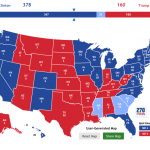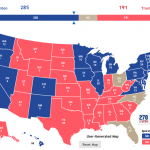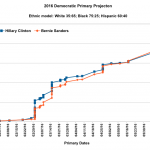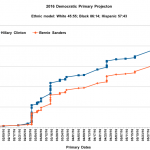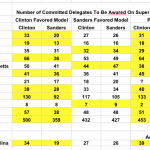Who will win?
Above is my latest electoral college projection.
This uses the technique previously described. However, instead of using RCP averages for all polled states and then using extreme (non-tossup) states to develop the regression model, this method uses only polling from states with one or more recent poll, and only with good polls. these poll numbers are then "predicted" by black/hispanic/white/Voted_Romney numbers, and that generates a model, based on just over 20 states, designed to predict all the states.
As expected, the r-squared value is much lower using this method, but this method does…
I've made my first stab at a prediction for the electoral college outcome for the US Presidential race, 2016. I use a roughly similar methodology as I did to accurately predict most of the Democratic primaries. However, since primaries are different from a general, the methodology had to be adapted.
For the primaries, I eventually used this methodology. I used results form prior primaries to predict voter behavior by ethnicity, in order to predict final behavior. That worked because primaries are done a few states at a time, and because all the people being modeled were Democrats.
It turns…
I developed a predictive model for the Democratic primaries that was designed to have the following features:
1) It does not rely on polling;
2) It does use exit polling and other information to set certain parameters;
3) It mainly uses prior primary or caucus results to predict the future, and thus assumes that the status quo is the best indicator.
4) It calculates likely voting patterns based on ethnicity (White, African American, Hispanic), and using likely Democratic party distribution among these groups to predict each contest's outcome.
That method outperformed most other predictions…
As you know, I developed a simple model for projecting future primary outcomes in the Democratic party. This model is based on the ethnic mix in each state, among Democratic Party voters. The model attributes a likely voting choice to theoretical primary goers or causers based on previous behavior by ethnicity. Originally I made two models, one using numbers that the Clinton campaign was banking on, and one using numbers that the Sanders campaign was banking on.
The results of the Super Tuesday primaries demonstrated that the Sanders-favoring model does not predict primary outcomes.…
You may be asking yourself the same question, especially if, like me, you vote on Tuesday, March 1st.
For some of us, a related question is which of the two is likely to win the nomination.
If one of the two is highly likely to win the nomination, then it may be smart to vote for that candidate in order to add to the momentum effect and, frankly, to end the internecine fighting and eating of young within the party sooner. If, however, one of the two is only somewhat likely to win the nomination, and your preference is for the one slightly more likely to lose, then you better vote for the…
